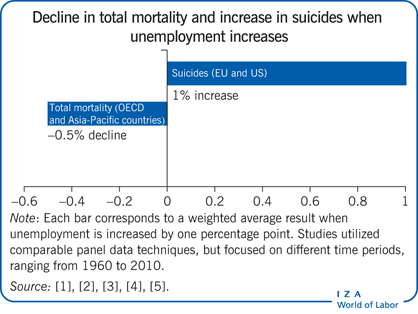Elevator pitch
Recessions are complex events that affect personal health and behavior via various potentially opposing mechanisms. While recessions are known to have negative effects on mental health and lead to an increase in suicides, it has been proven that they reduce mortality rates. A general health policy agenda in relation to recessions remains ambiguous due to the lack of consistency between different individual- and country-level approaches. However, aggregate regional patterns provide valuable information, and local social planners could use them to design region-specific policy responses to mitigate the negative health effects cause by recessions.
Key findings
Pros
Substantial country-level research shows that mortality declines (i.e. people live longer) during recessions.
Recessions can make more time available for individuals to lead a healthy lifestyle.
Motor vehicle deaths have been shown to decrease during recessions.
Some studies suggest that during recessions the stigma of being unemployed decreases.
Cons
A plethora of individual-level studies show that recessions lead to adverse mental health, especially for working-age and low-income people.
The number of suicides appears to increase during periods of recession.
Income loss due to recessions decreases investments in health-enhancing goods and services.
Austerity measures that may be common during recessions, such as budget cuts to social welfare, mainly affect vulnerable population groups and the long-term unemployed.
